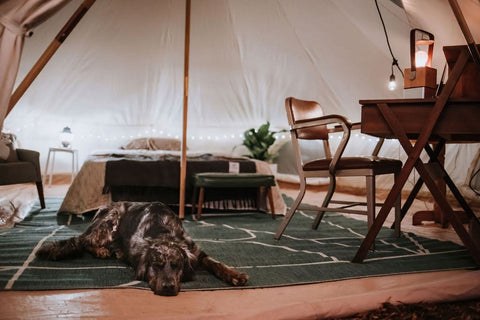FREE SHIPPING & NO SALES TAX
Free Shipping

Pay No Sales Tax
30-Month Warranty
FREE SHIPPING & NO SALES TAX
Tents
Shop


The LiT List
Glamping & Camping Ideas + Resources
How to Make Your Tent Smell Fresh After Camping
4 min read 0 Comments
If you love to camp in tents, there’s nothing better than inhaling that cleanmountain air with your family and closest pals. But who wants to climb into a stinky tent at day’s end? How can you keep things fresh?
Tent odors may arise for several reasons. Fortunately, you can identify the right cause and banish that funk. Here’s how to make your tent smell fresh after camping and keep it smelling as sweet as the outdoors you live to explore.
What’s Making Your Tent Stinky?
Your first order of business is to determine the source of the funk. There are three common culprits:
- Bacteria
- Mold and mildew
- Polyurethane breakdown
Bacteria are everywhere. They flourish on your skin and in the natural environment, and problems arise when too many of them gather and multiply in an enclosed space. It’s fairly easy to prevent bacterial buildup — airing your tent out properly after each trip does the trick.
Mold and mildew can damage your tent’s fabric — and your health. Fortunately, several methods of removal protect your investment and lungs, which we’ll describe in detail below.
Finally, when chemicals like polyurethane begin breaking down, they produce a vomit-like odor that’s distinctly unpleasant. Getting rid of it requires removing the old coating and applying a fresh seal.

How to Make Your Tent Smell Fresh After a Camping Trip
To make your tent smell fresh after a camping trip, you should air it out. Follow these stepsafter every excursion:
- Ensure the weather will remain warm and sunny for a few hours. A stiff breeze is even better.
- Find a clear, dry spot to pitch your tent — setting it up on your deck creates airflow from below.
- Open all doors and windows and leave it air out for at least an hour or until all surfaces are thoroughly dry. Never put away a wet tent, as it can spur mold growth.
Some folks hang their tent over a laundry line to ensure the bottom gets dry, although this can allow moisture to gather elsewhere. As long as the earth is dry, pitch it and open it. If you expect lousy weather to last for a stretch, consider pitching your tent in your house and running a dehumidifier.
How to Get a Stubborn Mildew Smell Out of a Tent
Mold and mildew can impact your health,worsening allergies and causing problems for those with weakened immune systems. Furthermore, they produce a lingering musty odor. How can you get that stubborn smell out of your tent? Fortunately, it’s not difficult to clean using one of these methods.
1. Bleach
Bleach is often a go-to for mold removal, but it can damage your tent’s fabric, which is why many campers prefer to avoid it. If you choose this route, do a patch test in an inconspicuous area to ensure you won’t end up with discoloration.
Use one part bleach to 10 parts water. Apply the solution to the affected area via a spray bottle and let soak for 10 minutes before rinsing and drying.
2. Vinegar and Baking Soda
Many campers prefer vinegar and baking soda. The standard recipe is one part vinegar to one part water, although you can go higher in strength without damaging most fabrics. Spray on the affected area and wait an hour. You can also coat the treated area with baking soda after applying the vinegar to further absorb odor.
3. Enzymatic Mold Removers
There’s a wealth of enzymatic mold removers on the market. Seek a brand specifically formulated for your tent’s fabric and follow the manufacturer’s instructions. A few work with spot applications, although many require you to soak your entire tent.

How to Make an Old Tent Smell Better
Have you noticed that your aging tent has started to reek like vomit, even though you’ve never gotten sick on a camping trip? How can you make your tent smell better if you have always aired it out and have no mold growth? The problem could be a breakdown of the polyurethane many manufacturers use to waterproof tents, which produces a signature nasty scent after sufficient exposure to the sun’s UV rays.
To address the issue, you must first remove the old coating. You’ll need a tub big enough to soak your tent for two to three hours in soapy water. Scrub the treated areas, such as the flies and tent floor, with a 50/50 blend of isopropyl alcohol, water and a few drops of clear dish soap. Allow it to dry thoroughly before applying a fresh protectant coating. Consider one of thenew plant-based polyurethane formulations for fewer odors and greater sustainability.
Prevent Tent Odors From Occurring
Once you get smells out of your tent, how can you keep it fresh and make it smell better? Following the above tips helps, but modern technology can also provide answers.
For example, many campers today carry portable power banks with them. Aromatherapy misters use essential oils and the heavenly scent quickly permeates a small space. Even those who prefer to stay disconnected while in the wild can usea rechargeable fan with an aroma diffuser to distribute a eucalyptus or citrus aroma.
What if you’re so hardcore that you eschew all tech outside of a compass and a can of bear spray? Dryer sheets have long freshened things stored in confined spaces. Some folks also use bags of activated charcoal.
You might also consider giving up on the battle of the bag. It may seem impossible to get your tent back inside most times, so just keep that sack for pole storage. Instead, roll and bind your tent loosely to prevent odors from accumulating in the first place.
Making Your Tent Smell Fresh After Camping
Part of the joy of camping is the clean mountain air. Learning how to make your tent smell fresh is all a part of the journey.
Use the above tips to get smells out of your tent regardless of the cause. A little ingenuity and proper maintenance make your tent smell better and enhance your enjoyment of your favorite pastime.
Related Resources

THE LIT LIST 3 min read 0 Comments
8 Unique and Versatile Uses For a Firewood Carrier
A firewood carrier is already a handy tool. But did you know they can also be quite versatile? It go
THE LIT LIST 6 min read 0 Comments
Feeling Fresh: Essential Toiletries to Pack for Camping
Wondering what toiletries to pack for camping? Packing the right toiletries is essential for a comfo Popular Blogs
Subscribe
Sign up to get the latest on sales, new releases and tips
BECOME AN INSIDER
We’ll periodically share inspiration, bell tent releases, special offers, and event notifications with ya.


